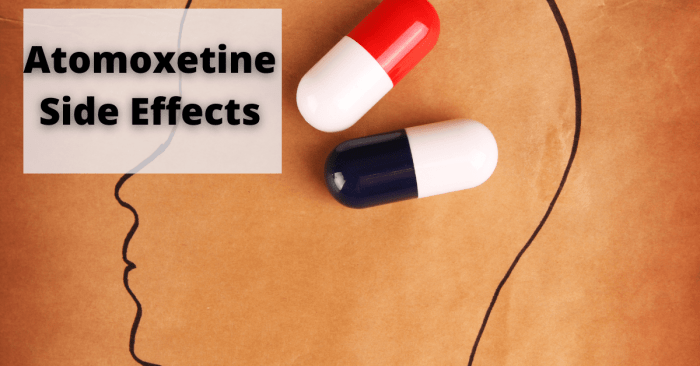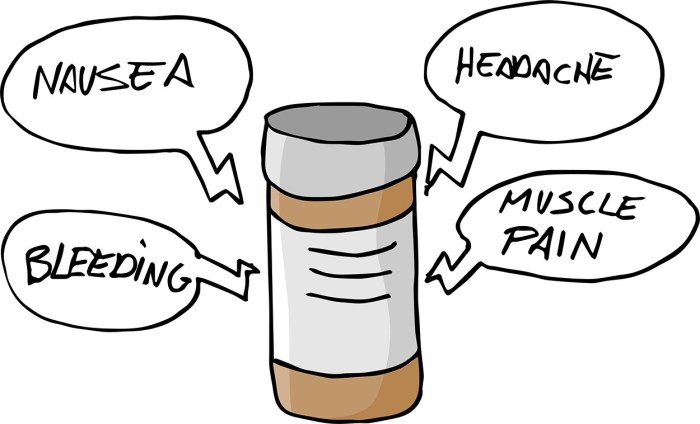Atomoxetine side effects are a common concern for individuals taking this medication, which is primarily used to treat attention-deficit/hyperactivity disorder (ADHD). Atomoxetine works by increasing levels of norepinephrine, a neurotransmitter that plays a role in focus and attention. While generally well-tolerated, atomoxetine can cause a range of side effects, from mild to severe, affecting various bodily systems.
Understanding the potential side effects of atomoxetine is crucial for patients and healthcare providers to make informed decisions about treatment. This article will delve into the most common side effects, exploring their impact on the digestive system, central nervous system, cardiovascular system, and other aspects of health. We will also discuss potential interactions with other medications, long-term effects, and strategies for managing side effects.
Introduction to Atomoxetine: Atomoxetine Side Effects

Atomoxetine, sold under the brand name Strattera, is a medication primarily used to treat attention-deficit/hyperactivity disorder (ADHD) in children, adolescents, and adults. It is a non-stimulant medication that works by increasing the levels of norepinephrine in the brain.
Atomoxetine works by increasing the levels of norepinephrine, a neurotransmitter that plays a crucial role in attention, focus, and impulse control. By increasing norepinephrine levels, atomoxetine helps to improve these functions in individuals with ADHD.
Dosage and Administration
Atomoxetine is typically administered orally, once a day. The dosage is individualized based on the patient’s age, weight, and response to treatment. The starting dosage is usually lower and gradually increased until the desired effect is achieved. It is important to follow the doctor’s instructions carefully and not to skip or double doses.
Common Side Effects

Atomoxetine, like many medications, can cause side effects. While not everyone experiences them, it’s essential to be aware of the possibilities and discuss any concerns with your doctor.
The most common side effects of atomoxetine are generally mild and tend to improve over time. However, some individuals may experience more severe side effects, which may require adjustments to the medication or alternative treatment options. It’s crucial to report any concerning symptoms to your doctor promptly.
Side Effects by Severity
The following table Artikels the most frequently reported side effects of atomoxetine, categorized by their severity:
| Severity | Side Effects |
|---|---|
| Mild |
|
| Moderate |
|
| Severe |
|
Digestive System Side Effects
Atomoxetine can affect the digestive system, leading to side effects like nausea, vomiting, and stomach pain. These side effects are typically mild and tend to subside as your body adjusts to the medication. If these symptoms persist or worsen, it’s important to consult your doctor.
Appetite Suppression and Weight Loss, Atomoxetine side effects
Atomoxetine can sometimes suppress appetite, leading to weight loss. This is more common in children and adolescents. If you notice a significant decrease in appetite or weight loss, it’s essential to discuss it with your doctor. They may recommend adjustments to your medication or dietary changes to manage these side effects.
Living with ADHD can be challenging, and atomoxetine offers a valuable treatment option for many individuals. By understanding the potential side effects and taking appropriate steps to manage them, patients can maximize the benefits of atomoxetine while minimizing any adverse effects. Open communication with your healthcare provider is essential to ensure that you receive the best possible care and that any concerns are addressed promptly. Remember, you are not alone in this journey, and seeking support from healthcare professionals and patient communities can be incredibly beneficial.
While atomoxetine can be effective for treating ADHD, it’s important to be aware of potential side effects like decreased appetite, nausea, and insomnia. These can sometimes be managed with lifestyle changes, but in some cases, alternative treatments like somatropin might be considered. However, it’s crucial to consult with a healthcare professional to determine the best course of action for your specific needs.